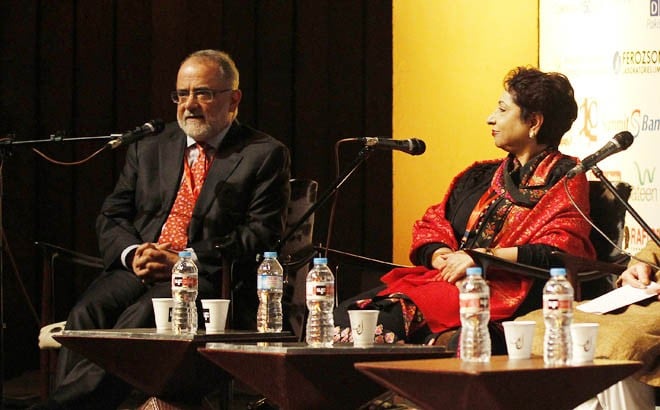

In the midst of all things literature and culture, the organisers had thrown about a few sessions here and there to discuss politics. Perhaps because in Pakistan any social or literary discourse is incomplete without discussing politics.
The session titled ‘Afghanistan on the brink’ had a panel of well-known names such as Ahmed Rashid, Rashed Rahman, Maleeha Lodhi, Hina Rabbani Khar and Vali Nasr. Since the discussion promised to be enlightening, the hall was filled to capacity.
The speakers were quick to point out the mistakes Pakistan had made in the past especially with regards to its policy towards Afghanistan -- a policy of strategic depth. While Ahmed Rashid and Vali Nasr tried to list and analyse the mistakes Pakistan was still making, Lodhi went ahead with the popular national rhetoric and got a round of applause from the audience.
The discussion was dominated by Khar and Lodhi, both of whom felt that Pakistan’s government was clear in its policy towards how to deal with the Taliban. While Lodhi was more positive about the implementation of this policy and the role Pakistan had played so far, Khar warned of the consequences if Pakistan did not let its neighbour be and focus instead on internal security threats. "A country that does not have control over its borders is not a sovereign country and is a perceived threat to its neighbours," she candidly said.
During the Q&A session, the discussion turned more towards Pakistan’s own security situation and the national debate of talks vs operation. As questions were thrown to other speakers, the context of the discussion also changed. Lodhi, once again, was the only speaker who seemed to think there was absolutely nothing wrong with the government finding a peaceful solution to an ongoing conflict. Nasr and Rahman citing the example of Sri Lanka pointed out that before talking to militant forces any government needs to exert pressure over them to ensure they are no longer in a position of power -- an opinion of lost on the mainstream media.
Rashid also criticised the peace process saying there was no genuine lobby amongst the TTP. He was also the only one in the session who was aware of the fact that while the discussion insisted on looking at Afghanistan as a threat to regional peace and security, the real danger lay within the borders of Pakistan. He cited the example of various Afghan Taliban and even TTP leaders being provided asylum through sheer ignorance, incompetence and at times connivance of our political and military leadership.
Even though his voice drowned under the opinions, a journalist amongst the audience affirmed the point he was trying to make. Questioning Lodhi and Khar on the ‘clear’ government policy, he invited to take the panel along to Chauburji in Lahore, where a banned organisation regularly preaches amid banners. He also pointed towards the growing intolerance and extremism creeping in the society.
Even though the session lived up to its promise of being stimulating, it seemed naïve to be discussing Afghanistan as a threat when it is obvious that global situation has changed and it is our own country that is perceived more troubled and incompetent at dealing with extremism. This was probably a result of the organisers’ conscious policy to stay away from ‘local’ political issues.
Nonetheless, it provided the Lahori crowd an opportunity to hear a discussion that would usually not take place on mainstream media.
Read also: The second time ever